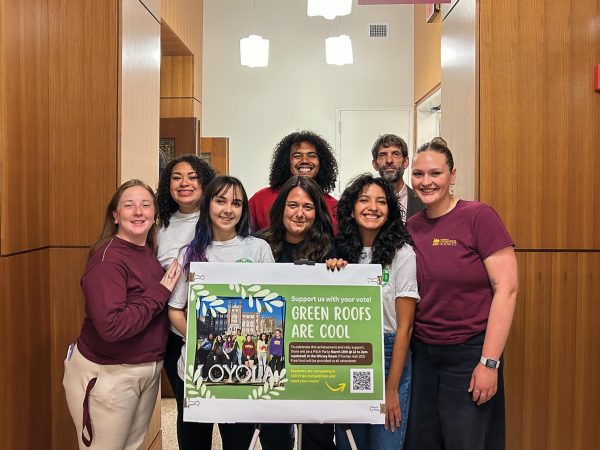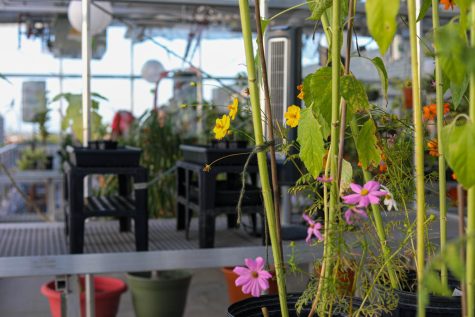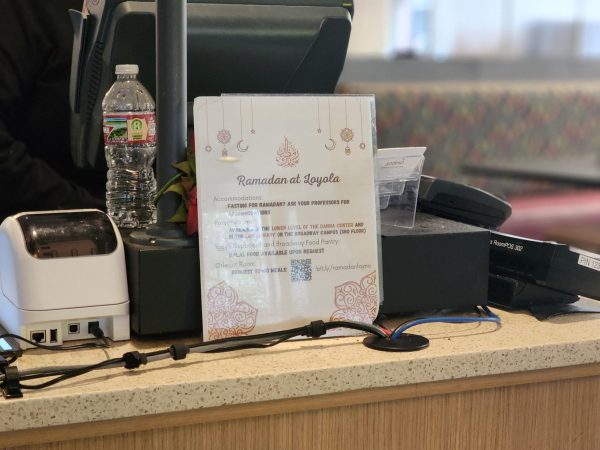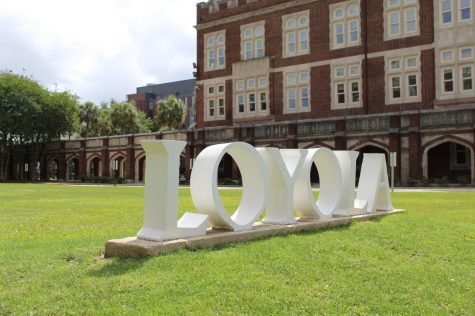Josefa Salmón named Faculty Member of the Year
Josefa Salmón received the Dux Academicus award for superior work as a faculty member Jan. 19, 2018, during the Spring Convocation in Nunemaker Auditorium. She is the first member of the Department of Languages and Cultures to receive the Dux Academicus. Photo credit: Kyle Encar
February 1, 2018
The Department of Languages and Cultures is home to a former diplomat, a variety of political activists, a certified interpreter and professors from over five different countries, but it has never been home to the winner of the Dux Academicus award. Until now.
Josefa Salmón, Spanish and Latin American studies professor and co-founder of The Bolivian Studies Association, shattered 40 years of Loyola tradition when she accepted the award for superior scholarship and teaching on Jan. 19.
“This award is especially significant for me as a Bolivian immigrant because there is a common notion about Bolivia as a place where there is nothing, as being the last place on earth. The main character in an Argentinian film, tells her husband: ‘Let’s go away just the two of us, even if it is to Bolivia.’; so, this award finally gives me the opportunity to answer that notion by saying: ‘Even a Bolivian can get a Dux Academicus Award’,” Salmón said during her acceptance speech.
“I really feel proud for my department. And also, I could not have done all the research and the organization of talks without the support of my department as a whole. That is why it is also their award,” Salmón said.
It was through nomination by her fellow professors that Salmón came to be honored with this award.
“I am proud to be a friend of hers. She’s an amazing person. Teaching is really an art of the mind and the heart, and she certainly has that down,” Alvaro Alcazar, adjunct faculty in the Latin American studies department, said.
In addition to faculty, consideration for the award also required a letter of support from students. Karla Rosas, A’15 and current Latin American studies graduate student at Tulane, was one of the students who endorsed Salmón for the award.
“Josefa’s energy is infectious. She presents the material in a way that keeps students interested and keeps us engaged by teaching via dialogue and not just relying on lecture,” Rosas said.
It was by listening to the interdisciplinary interests of students that Salmón saw the need for a course on Latin American cinema, so she created one, drawing students such as Rosas into her classroom.
“Even though I’m Latinx, I didn’t know much about films or politics from Latin America. What made it really intriguing for me was that we used films as a way of analyzing political and social events in Latin America,” Rosas said.
Providing students like Rosas with a specialized education on aspects of identity and history that often go uncelebrated has been Salmón’s goal since her arrival at Loyola in 1986.
“We offer a degree in Latin American studies to learn about these countries and to provide a fresh outlook for our students so that they can become conscious of our neighbors to the south in order to avoid easy categorizations or denigrations of these societies,” Salmón said.
Her insistence on a diversity of perspective is clear in her classes, her multilingualism and her recruitment of guest speakers. Salmón has organized talks with everyone from continental philosopher Slavoj Zizek to Alvaro Garcia Linera, the vice president of Bolivia, who video chatted with Loyola students last year.
Salmón said part of her openness to new ideas stems from her own experience as a student.
“As an undergraduate student, I first wanted to major in sociology, later in French, then philosophy, so I was an undecided major until my junior year. I would say I am still an undecided major, since my research has taken me in many directions,” Salmón said during her acceptance speech.
Salmón’s activism and dedication to the lives of students go beyond the classroom. When Rosas was contemplating graduate school, Salmón stepped in as her mentor.
“She continues to be in touch with our students who have graduated. I think it’s amazing that you get involved with a life and even after that life is no longer within the walls of the university, you stay connected,” said Alcazar.
What connects Salmón to her students long after they leave her classroom is the bond they develop through discussion and collaboration.
“Learning a foreign language is fundamental to learning about others, to living up to our Jesuit values of being for others. To learn a new language means not to learn one more word to represent an object, but to learn to look differently at an object, nature and society as a whole,” Salmón said.
Although Salmón is currently on sabbatical and wrapping up her time here at Loyola, she has made her mark by teaching both her students and the Dux Academicus Award selection committee to look at the world differently.


















